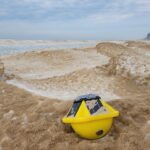From flood forecasting to winter buoys, 2023 has been a year full of innovative Great Lakes research at NOAA’s Great Lakes Environmental Research Laboratory (GLERL). As we get ready to ring in 2024, here’s a roundup of our top research stories throughout the year!
Robots give NOAA a peek under the ice of the Great Lakes
For a long time now, scientists have wanted to know more about what happens under the ice of the Great Lakes each winter, but getting the data has always been extremely challenging or almost impossible in this region. Over the last few years, NOAA GLERL has been working to develop new tools that may provide a fresh glimpse into the season. Read more

Failing Upwards: Developing an Autonomous Surface Vehicle to Advance ‘Omics Research
For engineers and scientists, sometimes failure means progress. On August 5, 2023, scientists from NOAA GLERL, NOAA’s Atlantic Oceanographic and Meteorological Laboratory (AOML), and the Monterey Bay Aquarium Research Institute (MBARI) watched as a new solar powered surface vehicle, the SeaTrac, sailed off across the Great Lakes. Read more

In the world of NOAA, some of the most significant scientific advancements come as a response to natural disasters. Over the past decade, NOAA GLERL has been working with international partners to develop new tools to mitigate flooding on the Lake Champlain-Richelieu River basin. Read more

Personnel Highlights of 2023
2023 was also a year full of accomplishments and recognition for GLERL’s leadership, scientists, and alumni. Congratulations to these members of the NOAA GLERL family!
GLERL Director Deborah Lee receives credential in sustainable infrastructure
This year, NOAA GLERL Director Deborah Lee was credentialed as an Envision Sustainability Professional by the Institute for Sustainable Infrastructure. She is the first NOAA employee to do so, and joins a group of more than 3400 engineering professionals nationwide with this credential. Read more

During his career at NOAA GLERL, Dr. David Reid’s work played an instrumental role in providing scientific evidence to support the improvement of ballast water management legislation for commercial shipping traffic entering the Great Lakes. Through this work, we have seen a sharp decline in the introduction of new AIS into the Great Lakes basin and a heightened awareness of the impacts that invasive species can have on our ecological, economic, and cultural resources. Read more

NOAA GLERL and CIGLR scientists ranked in World’s Best Scientists list
Several of our scientists were recognized on Research.com’s list of “World’s Best Scientists” for 2023! This ranking identifies and celebrates exceptional individual researchers who are having a significant impact on the research community. NOAA GLERL and Cooperative Institute for Great Lakes Research (CIGLR) scientists are listed in the categories of Ecology and Evolution and Environmental Sciences. Read more

Want to keep up with NOAA GLERL’s latest research and accomplishments in 2024? Follow us on Twitter, Instagram and Facebook to stay updated!

